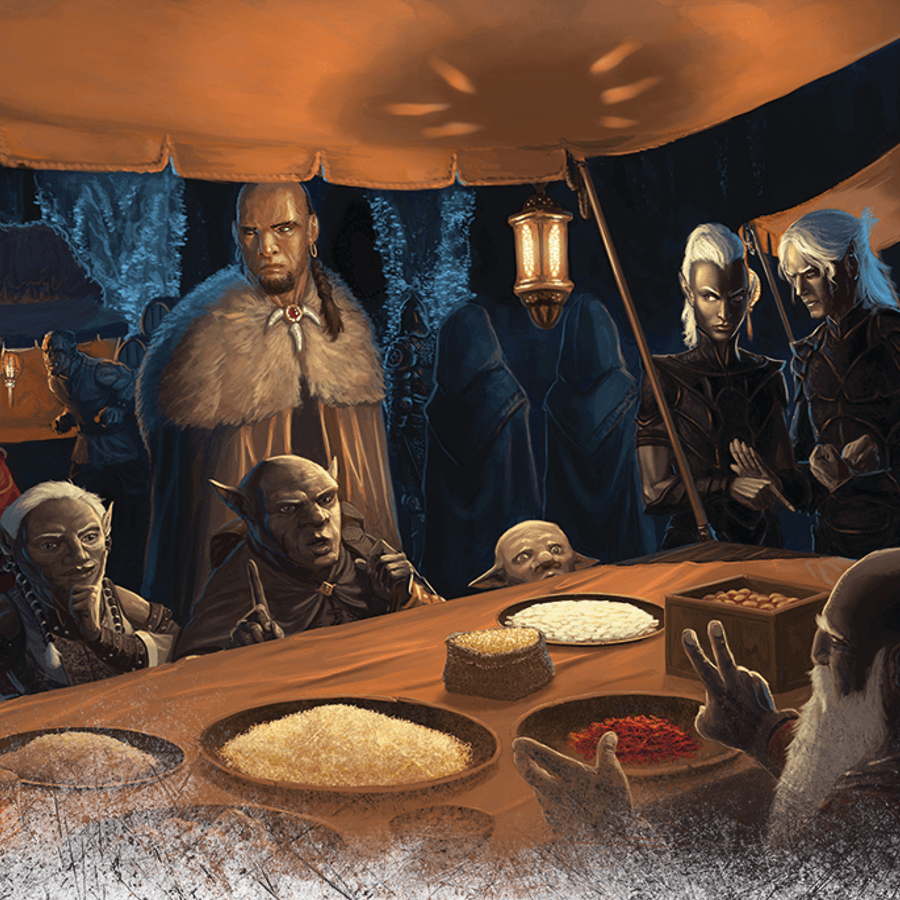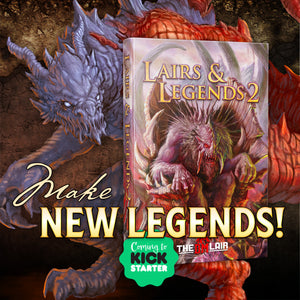The 9 Types of Terrible Game Masters

Written by Luke Hart
Today, we’ll go over the nine types of terrible game masters with the hope that you’ll avoid doing these things yourself. But, hey, if you’re going to be evil, you might as well learn from the best!
Watch or listen to this article by clicking the video below.
#1 The “Control Freak”
Our first type of terrible game master is a multi-faceted gem. Essentially, they take away player agency by not allowing players to do what they want.
The classic instance of this is limiting players’ options in the game. For example, they might only be able to go in the front door of the castle instead of climbing the walls, using the sally port, etc., because the GM has something special planned for that front door, and gosh darn it, those players are going through it come hell or high water!
Sometimes, the GM doesn’t even have a good reason. They just want to limit options because it’s what they want—player wishes be darned.
Other times, GMs deny player agency because they can’t or won’t improvise when the players do something they don’t expect, so instead, they just say, “No.”
However, the most pernicious aspect of this type of terrible GM is “the Storyteller.” This is the GM who wants to tell their story in the game without player input on what actually happens. Basically, they want to write a book through the game instead of playing it. Game masters like this often use the flimsy defense of saying, “The game master is the storyteller,” to justify their robbery of player agency.
#2 The GM Who Plays Favorites
Game masters like this do things like make one of the characters essential to the campaign plot, give them plot armor, and never allow them to die.
The GM might ensure that one player gets all the “wins” or big moments but that another player never gets the “wins” or gets to shine at the game table.
One player might get all the backstory or personal plot points, but another never gets that spotlight.
Or, the GM might withhold consequences from their favorite player or those who will throw a temper tantrum. You see? You don’t have to like the player to show favoritism.
In fact, the GM might even have one player they don’t like—come on, every game master does—and they play against that player, doing their best to make them fail. Or, they just have that player’s character suffer all the negative consequences in the game. Right about now, all my players are wondering, “Gee, which of us does Luke not like?” Oh, I love you all. All of you.
#3 The “Lazy” GM
This is the game master who doesn’t prepare for the game or dramatically under-prepares, resulting in a worse game experience for the players. This is not the GM who is aware of their strengths and weaknesses, prepares what they can’t improvise, and doesn’t prepare what they can improvise. No, no, no, this is the GM who just doesn’t prep and then justifies their laziness with trite expressions, such as, “A GM’s plans never survive first contact with the players.”
Some of these GMs think they’re so good they don’t need to plan and can improvise amazing games with no prep at all. Yeah, I met a GM like that once. Guess what—their game was horrible. Now, I’m not saying GMs like this don’t exist. What I’m saying is they are probably not you.
Furthermore, even if you can 100% improvise a good game, I guarantee your game would be much better if you also did some prep.
#4 The “Abuser,” the “Killer” DM, the “Adversarial” GM
This type of game master sees themselves as an adversary for the players, not their characters. They actively oppose the players and their goals. This GM wants to “win” and “defeat” the players.
They might do things such as fudge the dice roll or increase monster hit points so that monsters don’t die. However, they do this to win against the players, not to improve the game experience. You see, the means isn’t necessarily what’s evil in this case; it’s the intent.
GMs like this often withhold obvious information from the players because they didn’t specifically have their characters look for it.
Furthermore, this kind of GM may also ignore player boundaries. For instance, if a player is terrified of spiders, they might intentionally craft a dungeon themed around gigantic spiders and spider swarms, then, of course, target that player’s character more than others. Or, they might introduce graphic violence or sexual situations when one or more players have clearly stated they have issues with those things.
#5 The “Coddler,” the “Wishy-Washy” GM, and the “No Consequences” GM
In this game master’s games, there are never any real consequences. Death is off the table, or if a character somehow manages to die, the GM brings them back immediately one way or another—even using GM fiat if necessary.
This game master lets players push them around and bully them. They often change rule calls because a player isn’t happy with the results. For example, they might revise entire scenes or combats because the results were bad. These GMs also tend to avoid conflict outside of the game and won’t do what’s necessary to improve the game, such as removing a problem player or dealing with two players who don’t get along.
#6 The “World-Builder”, the “Architect,” the “Lore Master”
This game master is so invested in their world-building that they overload their players with unnecessary lore. Lore descriptions might go on for several minutes or—better yet!—come as thick handouts that the GM requires one player to read aloud to the others.
Look, some players love lore, but most don’t, and massive lore dumps can be boring. So, GMs should really limit themselves to giving the players the lore they will actually need for this adventure or the next. Foreshadowing, baby, foreshadowing!
The other issue is that players may think that everything the GM tells them is important and might get bogged down in the minutiae of the lore, furiously scribbling notes, asking for clarifications, and generally slow down gameplay . . . when only a fraction of that lore was actually relevant.
Game masters like this often spend so much time worldbuilding that they don’t plan their games—their adventures—much at all, so the adventures become lackluster during the game session. It’s like the one thing players mostly care about suffers, and the one thing most players don’t care about is outstanding. Those priorities are probably backward.
At the extreme, the GM might spend so much time worldbuilding that they never actually schedule the game and thus never use all the worldbuilding and lore.
#7 The “Tourist,” the “Next Big Thing” GM
This GM ends campaigns in the middle or rushes to the end because they can see something cool on the horizon.
This can be result from wanting to play a new game system—Dungeon Crawl Classics does seem super cool, after all—or having a “great new idea” for the next campaign in the same game system, or even just wanting to play in a different game world.
The issue is this can frustrate players who want to see a story through to the end, especially if the GM frequently tries to shift to the next big thing. Also, some players really enjoy their character and want to explore their story or abilities in higher tiers of play. Thus, they are disappointed when they never get past tiers one or two in a campaign.
If we’re talking about switching systems, some players don’t want to constantly learn a new rule set or have to buy new books all the time.
Speaking of which, frequently switching systems can also anger players who have invested a lot of money into buying players’ books or supplements for one game, just for the GM to want to jump to a different system.
Now, wanting to switch things up could also result from a GM who gets bored with the current campaign or burns out and, rather than talking to their players about it, thinks that “a change” is all it will take to get them back in “the zone.”
#8 The “Loot Fairy,” the “Monty Haul” GM . . . or the Opposite
This is the GM who gives out too much loot. Now, many players think they actually want this, and it is cool at first. However, this approach makes the loot “less special,” and it usually makes the game unbalanced. Furthermore, it can make the players expect the loot and feel entitled to it. Oooh, there’s a cool buzzword for you—entitlement—I bet that will set some folks off.
Or, it might be the GM who gives out too much experience (or skill points, or whatever the advancement mechanic is). Again, a lot of players think they actually want this. However, this leads to its own issues: Players don’t have time to experience their characters’ growth. Players don’t have time to get used to their abilities, and all the options become overwhelming, slowing gameplay down. Players might get flustered because they can’t keep up, and, of course, this could quickly make the game unbalanced, especially if you’re running a module designed for specific character levels.
And then we have the opposites. First, the GM doesn’t give out enough loot. In this case, the players might get frustrated because they don’t feel like they’re being rewarded for their actions. The players might never use their consumables because they’re afraid they won’t get anything else. Not having enough loot can also make the game unbalanced because character power lags behind the challenge of the adventures. Do you see a trend here?
There are also GMs who don’t give out enough experience points for character advancement. The players get frustrated with slow progression and bored with their characters because they never grow. A friend once told me about a GM he played under who only did level-ups once a year. He played at level 1 for several years because his character would die every so often and thus not qualify for a level-up. I mean, that’s just nuts. Naturally, not only can this make the game unenjoyable but, again, unbalanced.
#9 The Rules Problem
These game masters struggle with the rules in one way or another.
They might be too rigid with the rules to the point they enforce bad rules even when it would be more fun to make a different call. Or, they are too flexible with the rules to the point that the players have no consistency with what they can and can’t do within the ruleset.
This GM might not know the rules very well—or at all—and is either inconsistent when applying them or stops the game constantly to look them up. This GM may also make unnecessary or game-breaking house rules that are too complex or hurt the fun of the game. They might also over-homebrew everything or let the players bring in homebrew without checking it for balance.
Fun fact that has 100% been corroborated by scientific evidence: Of all the player homebrew rules on the internet, 90% are crazy OP and unbalanced. Allow them into your games without revisions at your own risk.
Get Loads of 5e Adventures and Resources for Your Games!
When I was a new dungeon master, I was overwhelmed with everything I needed to do. Learn the rules, create the adventures, run the game, handle problem players—it was A LOT! And even as a veteran DM, it’s still a lot. You might even feel that way yourself.
If you’re looking for loads of 5e adventures that you can prep in under 30 minutes, or elements such as traps, puzzles, and encounters that you can drag and drop into your game at moment’s notice, we have you covered!
With Lairs & Legends and Loot & Lore, you’ll get over 700 pages of 5e resources:
- Twenty-nine 5e adventures spanning levels 1 to 15 and designed for groups of 4 to 6 players.
- Over 100 new creatures from CR 0 to CR 24.
- Adventure Ideas
- Encounters with Full-Color and Blackline Digital Maps
- Patrons & Factions
- Magic Items
- NPCs
- Puzzles
- Random Encounter Tables
- Random Tables
- Spells
- Subclasses
- Traps
- Villains
Everything is designed to be EASY TO USE and QUICK TO PREP for your game. Our goal is to make game masters’ lives easier, not more complex!
Don’t spend another moment frustrated and overwhelmed as a DM. Pick up the Lairs & Legends Ultimate Bundle today and find out how much easier being a DM can be!
-
Posted in
Game Master How-To Articles







